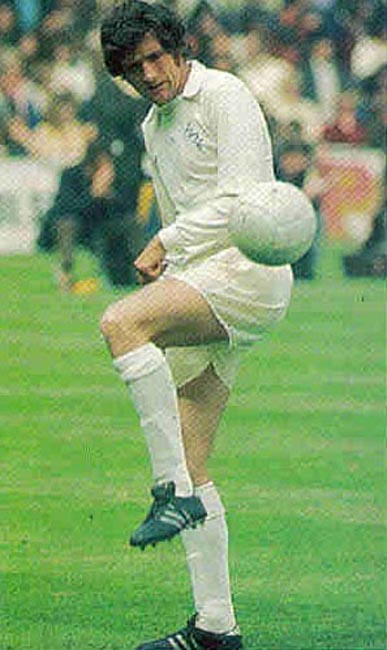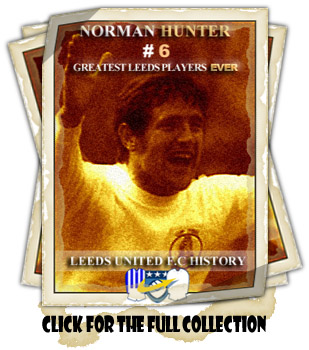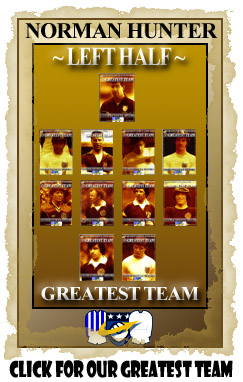

Hunter: Norman
1960-1976
(Player Details)
Central Defender
Born: Eighton Banks, Co. Durham: 24-10-1943
Debut: Swansea Town (a): 05-09-1962
5’11 1/2” 12st 8lb (1973)
#6 in 100 Greatest LUFC Players Ever

Left Half in Greatest LUFC Team

Norman “Bites Yer Legs” Hunter joined the Leeds groundstaff as a youngster in November
1960, after playing for Birtley Secondary Modern School, Birtley Juniors and Chester-le-Street.
Hunter was one of the fiercest competitors ever to pull on a Leeds United shirt. The United
defender reknowned for his tackling, relished the awesome reputation that often disguised the
fact that he was also an excellent footballer. The former electrical fitter turned
professional in April 1961 and made quick progress through the ranks and never looked back
after his first-team debut at Swansea in early 1962-63. He won three Under-Twenty-Three caps
and these were followed by twenty-eight full International appearances. There was a flurry of
representative honours just before his eventually final step of full International recognition.
His first Under-Twenty-Three cap came on 4th November 1964 in a 3-2 win over Wales at Wrexham
He was the first England player and three weeks later the second came in a 5-0 win at
Highfield Road, Coventry, over Rumania. The Third came later in the season in a 0-0 draw with
Scotland at Pittodrie, Aberdeen, on 24th February 1965, when he lined up with Mick Jones and
Paul Reaney.to be capped as a substitute when he played against Spain in December1965 before
making his full debut against West Germany in February 1966. Hunter also turned out for the
Football League six times and only the presence of England Captain Bobby Moore stopped him
earning more international honours. He was called up by the Football League on 28th October
1964 for the 4-0 win over the Irish League in Belfast and the 2-2 draw with the Scottish
League at Hampden Park on 17th March 1965. There were four more games for the Football League
on 27th October 1965 in a 5-0 win over the League of Ireland at Boothferry Park, HUll, on
16th March 1966 against the Scottish League in a 1-3 defeat at St James' Park, Newcastle, on
27th September 1967in Brussels in a 2-2 draw with the Belgian League and the sixth, and final
game, on 10th September 1969 in a 3-0 win over the League of Ireland at Oakwell, Barnsley. He
was in the squad which won the 1966 World Cup but never kicked a ball. He did however receive
a winners medal in 2007 for the 1966 tournament after FIFA retrospectively awarded all squad
members of winning teams before 1978 winners medals as has been the custom from 1978 onwards.
His central defensive partnership with Jack Charlton was the corner stone of United’s success
for over a decade. Leeds were promoted as Second Division Champions in 1963-64 and a year
later came very close to the "double" of League Championship and FA Cup with Hunter to the
fore. However, they lost the title to Manchester United on goal average and were beaten 2-1
by Liverpool in the FA Cup final, though Hunter's accurate long pass into the Liverpool area
did start the move which led to Billy Bremner's goal. Leeds progressed through the 1960s,
never once coming lower than fourth in the title race, and Hunter picked up a medal as they
won the League Cup and their first European honour with the Inter-Cities Fairs Cup in 1968.
A year later he won his first title medal and then in 1969-70 he was part of the team which
ceaselessly sought a unique "treble", but won nothing. Leeds chased the League championship
but lost the race on the last day of fixtures to Everton, went close to the European Cup but
were beaten by Celtic in the semi finals, and went after the FA Cup but lost after a replay
to Chelsea. Hunter spent a short part of that season injured but despite his race for fitness
and disappointment at the end of the campaign, he was still in Alf Ramsey's squad for the
summer's World Cup in Mexico, coming on as a substitute in the 3-2 defeat by West Germany.
Leeds were again thwarted in 1970-71 when Arsenal took the League title with a 1-0 win over
Tottenham Hotspur. Defeat or a score draw for Arsenal and the title would have gone to Leeds.
In the FA Cup, Leeds fell victim to one of the competition's great giant-killing acts when
Colchester United beat them 3-2 in the fifth round. They were 3-0 up, with Hunter then
scoring one of Leeds' goals as they attempted a comeback. Leeds did, however, win their
second Fairs Cup that season. In 1971-72, Hunter's joy as he fought the Leeds cause was
captured in one of football's most magnificent photographs. Leeds once again reached the
final of the FA Cup, a competition they had yet to win, and at Wembley they faced holders
Arsenal. In a tight and not thrilling game, Leeds opened the scoring midway through the
second half when Allan Clarke headed home a cross from Mick Jones. Hunter's defensive
position meant that he was at the opposite end of the pitch to Clarke when the Leeds striker
launched his diving header, Hunter, like most central defenders, only went forward for
set-pieces or when running with the ball at his feet. A photographer behind the Leeds goal,
at the opposite end to Clarke, captured the moment as Hunter leapt high in the air in
celebration with arms and legs spread, as if in the midst of a star-jump. Leeds held on to
win 1-0 and Hunter had his FA Cup winners' medal at last. At the end of the game, Hunter
climbed the steps to the Royal box twice, once to collect his own medal, and then again to
help the badly injured Jones negotiate his way up and down. Jones had been receiving
treatment for a dislocated shoulder while his team-mates had been getting their prizes. The
next year, 1972-73, Leeds reached two finals, that of the FA Cup again, and also the
European Cup-Winners Cup. Yet again, however, there would be disappointment for Leeds.
Sunderland surprisingly won the FA Cup final and then AC Milan were victorious in the Cup
Winners Cup final in Greece, though the latter was tainted by a despairingly biased
performance by the referee, who sent Hunter off late in the game after "missing" a foul
committed on the Leeds defender who retaliated in frustration. The referee was quickly
banned by UEFA from officiating again, but the result stood. He was remarkably consistent,
playing in five ever-present seasons and featured in all United’s Cup Finals from 1965 to
1975, finishing with two League Championship medals, an FA Cup Winners’ medal, A League Cup
Winners’ medal and two Inter-Cities Fair Winners’ medals and a Second Division Championship
medal to add to the honour of being voted the PFA’s first-ever “Player of the Year” in 1973.
His glorious reign at Leeds ended when he went to Bristol City in October 1976 and he became
a firm favourite at Ashton Gate, making a hundred and eight League appearances and scored
four goals. In June 1979 he became player-coach at Barnsley under Allan Clarke, where he
made twenty eight starts in the Leagueand three substitute appearances, before hanging up
his boots. When Clarke left for Leeds, Hunter took over at Oakwell in September 1980 and
steered them into Division Two. He was surprisingly axed in February 1984 and had a spell
as Assistant Manager to Johnny Giles at West Bromwich Albion before going to Rotherham
United as Manager in June 1985. He was dismissed in December 1987 and joined the coaching
staff at Leeds in February 1988 but lost his job in October that year when Howard Wilkinson
became Manager. Hunter became Assistant to Terry Yorath at Bradford City in February 1989,
but was axed twelve months later. He was a summariser for BBC Radio Leeds and Yorkshire Radio
on a regular basis for all the Leeds fixtures for many years.